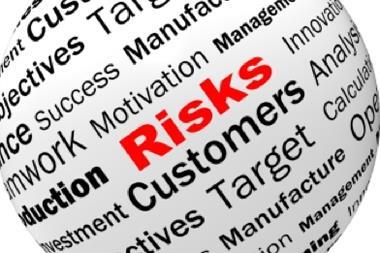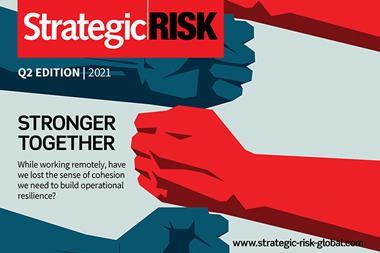In an exclusive interview with StrategicRISK, Christine Ribes, director internal control, risk and audit at GRDF, explains how risk professionals can stay positive when talking about risk

What kind of benefits can be gained from transforming a risk into an opportunity?
For the company, the benefits include the opening up of new business areas, strengthening the company’s sustainability in its existing business activities, and surviving in a fast-paced world where new economic models are ousting established norms and where technology and society are in constant flux.
For the risk manager, the benefits include avoiding being cast as the doom-monger of the organisation, and developing their role as a business manager. It will also help to make risk management even more meaningful by helping the organisation to change its perspective, and to move towards a culture where it may be more natural to highlight and work on weak points, rather than identifying and bolstering strengths, so that the organisation is better placed to adapt to its environment.
What measures can risk managers take to avoid being seen simply as doom-mongers in their day-to-day interactions with the executive committee and other departments?
Above all, it is important to consider the company culture, the type of business, its history and the core of the business and adapt your words and actions accordingly. Ask yourself how tolerant the company is to risk: what would happen if you were to take a ‘positive’ risk which was unsuccessful? An organisation which rewards risk takers who succeed yet punishes those who take risks and do not achieve the planned benefits is one which is against risk or risk-averse. Under these conditions, it would be difficult if not impossible to move the goalposts, or at best making a genuine change would be an uphill struggle. In this situation, it is crucial to gain the support of your boss.
To be able to turn risk into opportunity, risk managers should take the following steps:
- Ensure that you are approachable and able to listen to others.
- Show pragmatism: highlight areas in which priorities need to be established, avoid covering every little detail of action plans and instead support managers when choosing primary objectives (major risks or opportunities), enabling them to maximise added value as part of the risk/opportunity process.
- Strengthen cooperation with strategy and innovation managers. You may wish to organise a risk/opportunity seminar with the executive committee.
- Risk analysis should be supported or (preferably) preceded by opportunity analysis, e.g. “We must achieve this objective”. Rather than “What events would prevent us from achieving…”, start with “What events would enable us to exceed…?”
- Following the risk analysis, for each identified risk always ask “does this risk conceal opportunities for the company?”
- Always perform opportunity/risk analysis as a group (with people in the field, experts, senior management, young/older people, men and women, etc.).
- Use evidence to convince: opportunity/risk analysis which has opened up new areas that the company had not considered.
To summarise, the risk manager’s approach, a long-term commitment and visible support from senior management are all essential.
What methods can risk managers use to ensure that they achieve a good balance between being more positive (and highlighting opportunities), but also being sure that the executive committee is fully aware of the risks that the company is taking (and the methods used to resolve these risks)?
Opportunity is not mutually exclusive of risk. Indeed, seizing an opportunity without for example allocating sufficient resources (in skills or human or financial resources) poses a risk to the company.
In addition, to most major, long-standing groups or companies, the concept of risk is far more natural than the concept of opportunity. After all, when you already have it all, you are more fearful of losing what you have than if you have nothing. Therefore, it seems unlikely, in my opinion, that the risk management role will become obsolete! Furthermore, for risk managers in major groups whose role is generally well-defined, the difficulty is not so much ensuring that the executive committee is aware of the risks and how to manage them, but rather identifying new risks which may also be potential opportunities.
To ‘truly’ seize an opportunity, you need to adopt an entrepreneurial, risk-taking approach, take a stand and believe in your convictions, which is not always practised or encouraged by large companies. Unlike start-ups which have a credit risk from investors who invest at their own discretion, and accept the risk of losing their investment (and absorbing it), in order to transform the opportunity or original idea into an effective business model.
These young organisations will eventually experience the same issues as long-standing businesses. The main difference is perhaps that they are already versed in the need to adapt, innovate and develop. Google is a good example. While it perhaps doesn’t have a traditional risk management system in place, it has met the above need by setting up an innovative 5/5/5 approach (5 people, 5 weeks, $5000), which reflects its pragmatic vision to adapt rather than focusing on the risks of losing its current business (which perhaps it already believes it will lose sooner or later). It therefore searches for and tests out (capped risk) opportunities in order to shape its future business.
The real, albeit slightly controversial question is, what risk is there that the risk manager role will become obsolete?
And assuming it did, would it be possible to convert it to the role of ‘opportunity manager’ or, even better, ‘opportunity-risk manager’, providing the company with the skills of a coordinator, facilitator, and challenger, and using ERM methodology and exacting standards to coordinate the two approaches.
This could be a great opportunity to transform a risk!
How could transforming risks into opportunities develop risk managers’ position and role and promote them as business partners?
All companies are naturally delivery-orientated. Recent events have shown that a lack of thought about how a situation will develop and lack of anticipation can very quickly sink a business model and endanger a company’s sustainability.
Risk managers can facilitate and coordinate the company’s time to reflect on such matters. They can work with a group and provide their skills and methods. Their position enables them to fully listen to others, take an objective stance and draw on constructive dialogue to ultimately help to unlock areas of opportunity. Given their neutral, attentive and challenging stance, and due to their specific and cross-disciplinary position within the company and their need to work together with others in order to do their job, risk managers can establish a strong advisory and co-construction role, allowing them to strengthen their credentials as a business partner.




















No comments yet